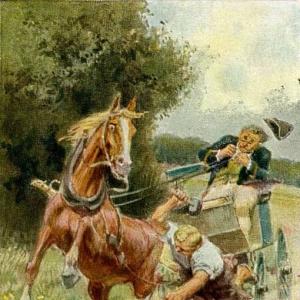Reading time: 27 min
There was once upon a time a tailor who had three sons, and only one goat. But as the goat supported the whole of them with her milk, she was obliged to have good food, and to be taken every day to pasture. The sons, therefore, did this, in turn. Once the eldest took her to the churchyard, where the finest herbs were to be found, and let her eat and run about there. At night when it was time to go home he asked, „Goat, hast thou had enough?“ The goat answered:
„I have eaten so much,
Not a leaf more I’ll touch, meh! meh!“
„Come home, then,“ said the youth, and took hold of the cord round her neck, led her into the stable and tied her up securely. „Well,“ said the old tailor, „has the goat had as much food as she ought?“ – „Oh,“ answered the son, „she has eaten so much, not a leaf more she’ll touch.“ But the father wished to satisfy himself, and went down to the stable, stroked the dear animal and asked, „Goat, art thou satisfied?“ The goat answered:
„Wherewithal should I be satisfied?
Among the graves I leapt about,
And found no food, so went without, meh! meh!“
„What do I hear?“ cried the tailor, and ran upstairs and said to the youth, „Hollo, thou liar: thou saidest the goat had had enough, and hast let her hunger!“ and in his anger he took the yard-measure from the wall, and drove him out with blows.
Next day it was the turn of the second son, who looked out for a place in the fence of the garden, where nothing but good herbs grew, and the goat cleared them all off.
At night when he wanted to go home, he asked, „Goat, art thou satisfied?“ The goat answered:
„I have eaten so much,
Not a leaf more I’ll touch, meh! meh!“
„Come home, then,“ said the youth, and led her home, and tied her up in the stable. „Well,“ said the old tailor, „has the goat had as much food as she ought?“ – „Oh,“ answered the son, „she has eaten so much, not a leaf more she’ll touch.“ The tailor would not rely on this, but went down to the stable and said, „Goat, hast thou had enough?“ The goat answered,
„Wherewithal should I be satisfied?
Among the graves I leapt about,
And found no food, so went without, meh! meh!“
„The godless wretch!“ cried the tailor, „to let such a good animal hunger,“ and he ran up and drove the youth out of doors with the yard-measure.
Now came the turn of the third son, who wanted to do the thing well, and sought out some bushes with the finest leaves, and let the goat devour them. In the evening when he wanted to go home, he asked, „Goat, hast thou had enough?“ The goat answered:
„I have eaten so much,
Not a leaf more I’ll touch, meh! meh!“
„Come home, then,“ said the youth, and led her into the stable, and tied her up. „Well,“ said the old tailor, „has the goat had a proper amount of food?“ – „She has eaten so much, not a leaf more she’ll touch.“ The tailor did not trust to that, but went down and asked, „Goat, hast thou had enough?“ The wicked beast answered,
„Wherewithal should I be satisfied?
Among the graves I leapt about,
And found no leaves, so went without, meh! meh!“
„Oh, the brood of liars!“ cried the tailor, „each as wicked and forgetful of his duty as the other! Ye shall no longer make a fool of me,“ and quite beside himself with anger, he ran upstairs and belabored the poor young fellow so vigorously with the yard-measure that he sprang out of the house.
The old tailor was now alone with his goat. Next morning he went down into the stable, caressed the goat and said, „Come, my dear little animal, I will take thee to feed myself.“ He took her by the rope and conducted her to green hedges, and amongst milfoil, and whatever else goats like to eat. „There thou mayest for once eat to thy heart’s content,“ said he to her, and let her browse till evening. Then he asked, „Goat, art thou satisfied?“ She replied,
„I have eaten so much,
Not a leaf more I’ll touch, meh! meh!“
„Come home, then,“ said the tailor, and led her into the stable, and tied her fast. When he was going away, he turned round again and said, „Well, art thou satisfied for once?“ But the goat did not behave the better to him, and cried,
„Wherewithal should I be satisfied?
Among the graves I leapt about,
And found no leaves, so went without, meh! meh!“
When the tailor heard that, he was shocked, and saw clearly that he had driven away his three sons without cause. „Wait, thou ungrateful creature,“ cried he, „it is not enough to drive thee forth, I will mark thee so that thou wilt no more dare to show thyself amongst honest tailors.“ In great haste he ran upstairs, fetched his razor, lathered the goat’s head, and shaved her as clean as the palm of his hand.
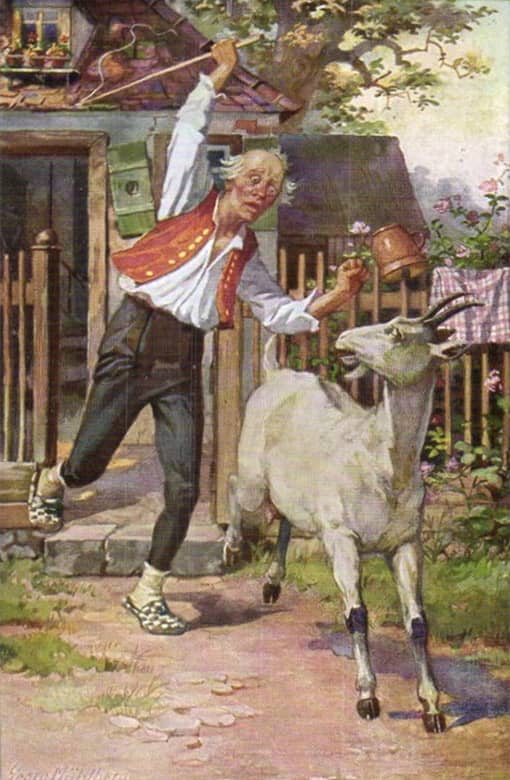 Image: Georg Mühlberg (1863-1925)
Image: Georg Mühlberg (1863-1925)And as the yard-measure would have been too good for her, he brought the horsewhip, and gave her such cuts with it that she ran away in violent haste. When the tailor was thus left quite alone in his house he fell into great grief, and would gladly have had his sons back again, but no one knew whither they were gone. The eldest had apprenticed himself to a joiner, and learnt industriously and indefatigably, and when the time came for him to go travelling, his master presented him with a little table which had no particular appearance, and was made of common wood, but it had one good property.
If anyone set it out, and said, „Little table, spread thyself,“ the good little table was at once covered with a clean little cloth, and a plate was there, and a knife and fork beside it, and dishes with boiled meats and roasted meats, as many as there was room for, and a great glass of red wine shone so that it made the heart glad.
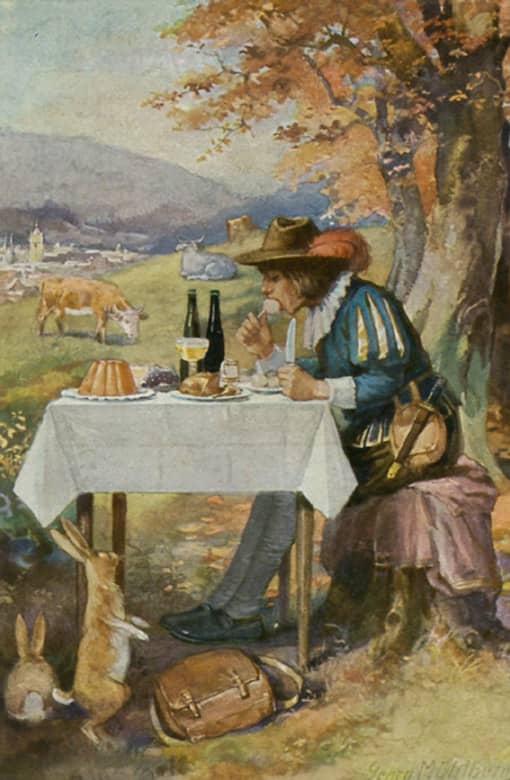 Image: Georg Mühlberg (1863-1925)
Image: Georg Mühlberg (1863-1925)The young journeyman thought, „With this thou hast enough for thy whole life,“ and went joyously about the world and never troubled himself at all whether an inn was good or bad, or if anything was to be found in it or not. When it suited him he did not enter an inn at all, but either on the plain, in a wood, a meadow, or wherever he fancied, he took his little table off his back, set it down before him, and said, „Cover thyself,“ and then everything appeared that his heart desired. At length he took it into his head to go back to his father, whose anger would now be appeased, and who would now willingly receive him with his wishing-table. It came to pass that on his way home, he came one evening to an inn which was filled with guests. They bade him welcome, and invited him to sit and eat with them, for otherwise he would have difficulty in getting anything. „No,“ answered the joiner, „I will not take the few bites out of your mouths; rather than that, you shall be my guests.“ They laughed, and thought he was jesting with them; he, however, placed his wooden table in the middle of the room, and said, „Little table, cover thyself.“ Instantly it was covered with food, so good that the host could never have procured it, and the smell of it ascended pleasantly to the nostrils of the guests. „Fall to, dear friends,“ said the joiner; and the guests when they saw that he meant it, did not need to be asked twice, but drew near, pulled out their knives and attacked it valiantly. And what surprised them the most was that when a dish became empty, a full one instantly took its place of its own accord. The innkeeper stood in one corner and watched the affair. He did not at all know what to say, but thought, „Thou couldst easily find a use for such a cook as that in thy kitchen.“ The joiner and his comrades made merry until late into the night; at length they lay down to sleep, and the young apprentice also went to bed, and set his magic table against the wall. The host’s thoughts, however, let him have no rest. It occurred to him that there was a little old table in his lumber-room which looked just like the apprentice’s and he brought it out quite softly, and exchanged it for the wishing-table. Next morning, the joiner paid for his bed, took up his table, never thinking that he had got a false one, and went his way. At mid-day he reached his father, who received him with great joy. „Well, my dear son, what hast thou learnt?“ said he to him. „Father, I have become a joiner.“ – „A good trade,“ replied the old man. „But what hast thou brought back with thee from thy apprenticeship?“ – „Father, the best thing which I have brought back with me is this little table.“ The tailor inspected it on all sides and said, „Thou didst not make a masterpiece when thou mad’st that. It is a bad old table.“ – „But it is a table which furnishes itself,“ replied the son. „When I set it out, and tell it to cover itself, the most beautiful dishes stand on it, and a wine also, which gladdens the heart. Just invite all our relations and friends, they shall refresh and enjoy themselves for once, for the table will give them all they require.“ When the company was assembled, he put his table in the middle of the room and said, „Little table, cover thyself,“ but the little table did not bestir itself, and remained just as bare as any other table which did not understand language. Then the poor apprentice became aware that his table had been changed, and was ashamed at having to stand there like a liar. The relations, however, mocked him, and were forced to go home without having eaten or drunk. The father brought out his patches again, and went on tailoring, but the son went to a master in the craft.
The second son had gone to a miller and had apprenticed himself to him. When his years were over, the master said, „As thou hast conducted thyself so well, I give thee an ass of a peculiar kind, which neither draws a cart nor carries a sack.“ – „To what use is he put, then?“ asked the young apprentice. „He lets gold drop from his mouth,“ answered the miller. „If thou settest him on a cloth and sayest ‚Bricklebrit,‘ the good animal will drop gold pieces for thee.“ – „That is a fine thing,“ said the apprentice, and thanked the master, and went out into the world. When he had need of gold, he had only to say „Bricklebrit“ to his ass, and it rained gold pieces, and he had nothing to do but pick them off the ground. Wheresoever he went, the best of everything was good enough for him, and the dearer the better, for he had always a full purse. When he had looked about the world for some time, he thought, „Thou must seek out thy father. If thou goest to him with the gold-ass he will forget his anger, and receive thee well.“ It came to pass that he came to the same public-house in which his brother’s table had been exchanged. He led his ass by the bridle, and the host was about to take the animal from him and tie him up, but the young apprentice said, „Don’t trouble yourself, I will take my grey horse into the stable, and tie him up myself too, for I must know where he stands.“ This struck the host as odd, and he thought that a man who was forced to look after his ass himself, could not have much to spend; but when the stranger put his hand in his pocket and brought out two gold pieces, and said he was to provide something good for him, the host opened his eyes wide, and ran and sought out the best he could muster. After dinner the guest asked what he owed. The host did not see why he should not double the reckoning, and said the apprentice must give two more gold pieces. He felt in his pocket, but his gold was just at an end. „Wait an instant, sir host,“ said he, „I will go and fetch some money;“ but he took the table-cloth with him. The host could not imagine what this could mean, and being curious, stole after him, and as the guest bolted the stable-door, he peeped through a hole left by a knot in the wood. The stranger spread out the cloth under the animal and cried, „Bricklebrit,“ and immediately the beast began to let gold pieces fall, so that it fairly rained down money on the ground.
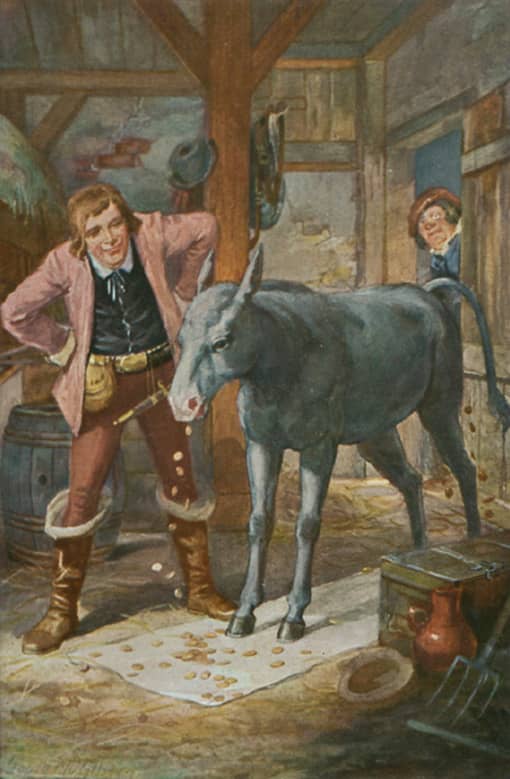 Image: Georg Mühlberg (1863-1925)
Image: Georg Mühlberg (1863-1925)„Eh, my word,“ said the host, „ducats are quickly coined there! A purse like that is not amiss.“ The guest paid his score, and went to bed, but in the night the host stole down into the stable, led away the master of the mint, and tied up another ass in his place. Early next morning the apprentice travelled away with his ass, and thought that he had his gold-ass. At mid-day he reached his father, who rejoiced to see him again, and gladly took him in. „What hast thou made of thyself, my son?“ asked the old man. „A miller,“ dear father, he answered. „What hast thou brought back with thee from thy travels?“ – „Nothing else but an ass.“ – „There are asses enough here,“ said the father, „I would rather have had a good goat.“ – „Yes,“ replied the son, „but it is no common ass, but a gold-ass, when I say ‚Bricklebrit,‘ the good beast opens its mouth and drops a whole sheetful of gold pieces. Just summon all our relations hither, and I will make them rich folks.“ – „That suits me well,“ said the tailor, „for then I shall have no need to torment myself any longer with the needle,“ and ran out himself and called the relations together. As soon as they were assembled, the miller bade them make way, spread out his cloth, and brought the ass into the room. „Now watch,“ said he, and cried, „Bricklebrit,“ but no gold pieces fell, and it was clear that the animal knew nothing of the art, for every ass does not attain such perfection. Then the poor miller pulled a long face, saw that he was betrayed, and begged pardon of the relatives, who went home as poor as they came. There was no help for it, the old man had to betake him to his needle once more, and the youth hired himself to a miller.
The third brother had apprenticed himself to a turner, and as that is skilled labour, he was the longest in learning. His brothers, however, told him in a letter how badly things had gone with them, and how the innkeeper had cheated them of their beautiful wishing-gifts on the last evening before they reached home. When the turner had served his time, and had to set out on his travels, as he had conducted himself so well, his master presented him with a sack and said, „There is a cudgel in it.“ – „I can put on the sack,“ said he, „and it may be of good service to me, but why should the cudgel be in it? It only makes it heavy.“ – „I will tell thee why,“ replied the master; „if any one has done anything to injure thee, do but say, ‚Out of the sack, Cudgel!‘ and the cudgel will leap forth among the people, and play such a dance on their backs that they will not be able to stir or move for a week, and it will not leave off until thou sayest, „Into the sack, Cudgel!“ The apprentice thanked him, and put the sack on his back, and when any one came too near him, and wished to attack him, he said, „Out of the sack, Cudgel!“ and instantly the cudgel sprang out, and dusted the coat or jacket of one after the other on their backs, and never stopped until it had stripped it off them, and it was done so quickly, that before anyone was aware, it was already his own turn.
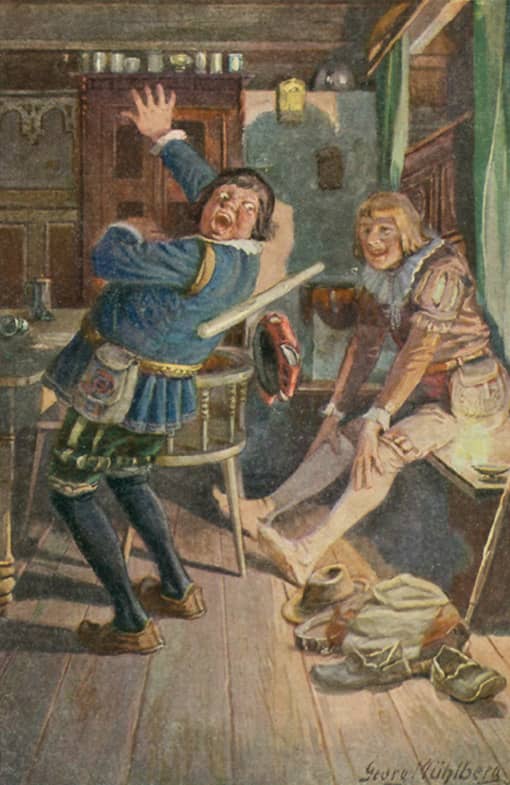 Image: Georg Mühlberg (1863-1925)
Image: Georg Mühlberg (1863-1925)In the evening the young turner reached the inn where his brothers had been cheated. He laid his sack on the table before him, and began to talk of all the wonderful things which he had seen in the world. „Yes,“ said he, „people may easily find a table which will cover itself, a gold-ass, and things of that kind — extremely good things which I by no means despise — but these are nothing in comparison with the treasure which I have won for myself, and am carrying about with me in my sack there.“ The inn-keeper pricked up his ears, „What in the world can that be?“ thought he; „the sack must be filled with nothing but jewels. I ought to get them cheap too, for all good things go in threes.“ When it was time for sleep, the guest stretched himself on the bench, and laid his sack beneath him for a pillow. When the inn-keeper thought his guest was lying in a sound sleep, he went to him and pushed and pulled quite gently and carefully at the sack to see if he could possibly draw it away and lay another in its place. The turner had, however, been waiting for this for a long time, and now just as the inn-keeper was about to give a hearty tug, he cried, „Out of the sack, Cudgel!“ Instantly the little cudgel came forth, and fell on the inn-keeper and gave him a sound thrashing. The host cried for mercy; but the louder he cried, so much more heavily the cudgel beat the time on his back, until at length he fell to the ground exhausted. Then the turner said, „If thou dost not give back the table which covers itself, and the gold-ass, the dance shall begin afresh.“ – „Oh, no,“ cried the host, quite humbly, „I will gladly produce everything, only make the accursed kobold creep back into the sack.“ Then said the apprentice, „I will let mercy take the place of justice, but beware of getting into mischief again!“ So he cried, „Into the sack, Cudgel!“ and let him have rest.
Next morning the turner went home to his father with the wishing-table, and the gold-ass. The tailor rejoiced when he saw him once more, and asked him likewise what he had learned in foreign parts. „Dear father,“ said he, „I have become a turner.“ – „A skilled trade,“ said the father. „What hast thou brought back with thee from thy travels?“ – „A precious thing, dear father,“ replied the son, „a cudgel in the sack.“ – „What!“ cried the father, „a cudgel! That’s worth thy trouble, indeed! From every tree thou can cut thyself one.“ – „But not one like this, dear father. If I say, ‚Out of the sack, Cudgel!‘ the cudgel springs out and leads any one who means ill with me a weary dance, and never stops until he lies on the ground and prays for fair weather. Look you, with this cudgel have I got back the wishing-table and the gold-ass which the thievish inn-keeper took away from my brothers. Now let them both be sent for, and invite all our kinsmen. I will give them to eat and to drink, and will fill their pockets with gold into the bargain.“ The old tailor would not quite believe, but nevertheless got the relatives together. Then the turner spread a cloth in the room and led in the gold-ass, and said to his brother, „Now, dear brother, speak to him.“ The miller said, „Bricklebrit,“ and instantly the gold pieces fell down on the cloth like a thunder-shower, and the ass did not stop until every one of them had so much that he could carry no more.
 Image: Georg Mühlberg (1863-1925)
Image: Georg Mühlberg (1863-1925)(I can see in thy face that thou also wouldst like to be there.) Then the turner brought the little table, and said, „Now dear brother, speak to it.“ And scarcely had the carpenter said, „Table, cover thyself,“ than it was spread and amply covered with the most exquisite dishes. Then such a meal took place as the good tailor had never yet known in his house, and the whole party of kinsmen stayed together till far in the night, and were all merry and glad. The tailor locked away needle and thread, yard-measure and goose, in a press, and lived with his three sons in joy and splendour.
What, however, has become of the goat who was to blame for the tailor driving out his three sons? That I will tell thee. She was ashamed that she had a bald head, and ran to a fox’s hole and crept into it. When the fox came home, he was met by two great eyes shining out of the darkness, and was terrified and ran away. A bear met him, and as the fox looked quite disturbed, he said, „What is the matter with thee, brother Fox, why dost thou look like that?“ – „Ah,“ answered Redskin, „a fierce beast is in my cave and stared at me with its fiery eyes.“ – „We will soon drive him out,“ said the bear, and went with him to the cave and looked in, but when he saw the fiery eyes, fear seized on him likewise. He would have nothing to do with the furious beast, and took to his heels.
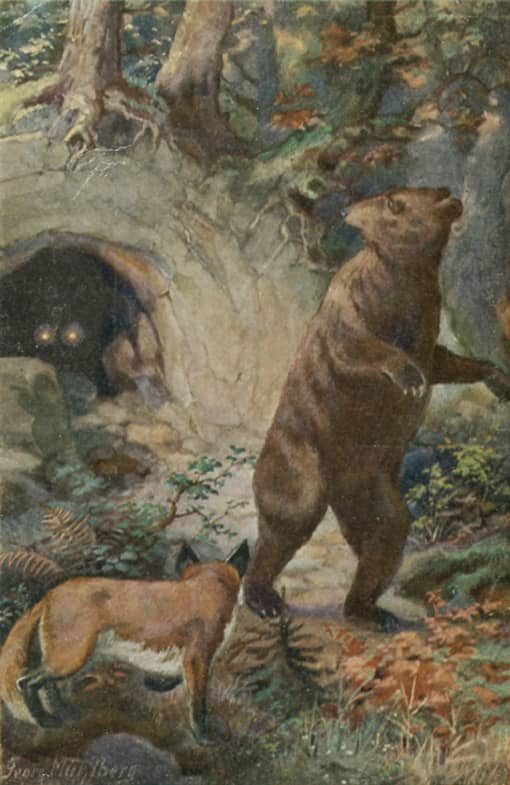 Image: Georg Mühlberg (1863-1925)
Image: Georg Mühlberg (1863-1925)The bee met him, and as she saw that he was ill at ease, she said, „Bear, thou art really pulling a very pitiful face. What has become of all thy gaiety?“ – „It is all very well for thee to talk,“ replied the bear, „a furious beast with staring eyes is in Redskin’s house, and we can’t drive him out.“ The bee said, „Bear I pity thee, I am a poor weak creature whom thou wouldst not turn aside to look at, but still, I believe, I can help thee.“ She flew into the fox’s cave, lighted on the goat’s smoothly-shorn head, and stung her so violently, that she sprang up, crying „Meh, meh,“ and ran forth into the world as if mad, and to this hour no one knows where she has gone.
 Learn languages. Double-tap on a word.Learn languages in context with Childstories.org and Deepl.com.
Learn languages. Double-tap on a word.Learn languages in context with Childstories.org and Deepl.com.Backgrounds
Interpretations
Adaptions
Summary
Linguistics
„The Wishing-Table, the Gold-Ass, and the Cudgel in the Sack“ is a German fairy tale collected by the Brothers Grimm in their famous anthology, „Grimm’s Fairy Tales“ (originally titled „Kinder- und Hausmärchen“). The first edition of the anthology was published in 1812, and the tale is also known as „Tischchen deck dich, Goldesel und Knüppel aus dem Sack“ in German.
The Brothers Grimm, Jacob and Wilhelm, were German scholars and linguists who collected and published numerous folktales and legends from the European oral tradition. Their primary aim was to preserve these stories and their cultural significance. Over time, the Grimm’s Fairy Tales became an essential part of the literary canon, and their work greatly influenced the study of folklore and the development of the modern fairy tale genre.
„The Wishing-Table, the Gold-Ass, and the Cudgel in the Sack“ is one of the lesser-known tales from the Grimm’s collection. The story follows the adventures of three brothers who each gain a magical object as a reward for their hard work: a table that can produce food on command, a donkey that can produce gold, and a cudgel that obeys its owner’s commands. The brothers encounter various challenges, including a deceitful goat and a greedy innkeeper, but ultimately triumph over adversity through their honesty, hard work, and perseverance. The tale teaches important lessons about honesty, integrity, the value of hard work, and the power of forgiveness and reconciliation.
„The Wishing-Table, the Gold-Ass, and the Cudgel in the Sack“ is a rich and engaging fairy tale that can be interpreted on several levels. Some of the key themes and interpretations include.
The importance of honesty and integrity: The goat in the story lies about not being fed enough, causing the sons to be unjustly punished. In contrast, the sons remain honest and hardworking throughout the tale, eventually triumphing over deceit and greed.
The consequences of greed and selfishness: The innkeeper, driven by his own greed, steals the magical table and donkey from the sons. However, his actions ultimately lead to his downfall when the youngest son uses the magical cudgel to retrieve the stolen items and ensure justice.
The value of hard work and perseverance: Each of the sons is rewarded for their dedication to their chosen crafts by receiving magical items. These items not only symbolize the fruits of their labor but also help them overcome obstacles and eventually reunite with their father.
The power of forgiveness and reconciliation: The father initially misjudges his sons, but when he learns the truth, he seeks their forgiveness and reconciles with them. The family’s reunion signifies the healing power of forgiveness and the importance of familial bonds.
The idea that appearances can be deceiving: The magical table, donkey, and cudgel appear to be ordinary objects, but they possess extraordinary powers. This theme serves as a reminder not to judge things (or people) based solely on their outward appearance.
The triumph of good over evil: The sons, who represent honesty, hard work, and integrity, ultimately overcome the deceitful goat and the greedy innkeeper. This theme reinforces the idea that good will ultimately prevail over evil.
In summary, „The Wishing-Table, the Gold-Ass, and the Cudgel in the Sack“ offers valuable lessons about honesty, integrity, perseverance, forgiveness, and the importance of not judging a book by its cover. Through the sons‘ journey, the story highlights the triumph of good over evil and the power of hard work and determination.
„The Wishing Table, the Gold-Ass, and the Cudgel in the Sack“ is a popular fairy tale that has inspired numerous adaptations over the years. Here are a few notable examples.
„The Wishing Table“ (TV series): This German television series from the 1970s adapted several Grimm’s fairy tales, including „The Wishing Table.“ The series was aimed at children and featured puppetry and live actors.
„The Magic Tablecloth“ (animated film): This animated film from 2017 is a loose adaptation of „The Wishing Table.“ It tells the story of a poor family who discovers a magical tablecloth that can provide an endless supply of food. The film was produced in Russia and features vibrant animation and a catchy soundtrack.
„Wunschpunsch“ (animated series): This French-Canadian animated series from the 1990s features two shape-shifting animals who try to take over the world using a magical table that grants wishes. While the series is not a direct adaptation of „The Wishing Table,“ it shares some similarities in terms of its magical objects and themes of greed and power.
„Der Wunschbrunnen“ (play): This German play from the early 20th century is an adaptation of „The Wishing Table.“ It features a poor farmer who discovers a magical well that can grant wishes. The play has been performed in various theaters throughout Germany and has become a popular Christmas tradition.
„The Wishing-Table“ (book): This children’s book by Rose Impey is a modern retelling of „The Wishing Table.“ It features three siblings who discover a magical table that can provide an endless supply of food. The book emphasizes the importance of sharing and kindness.
Overall, „The Wishing Table“ has inspired a wide range of adaptations in various media, from television series to plays to children’s books. Each adaptation puts its own unique spin on the classic tale while retaining its timeless themes and magical elements.
„The Wishing-Table, the Gold-Ass, and the Cudgel in the Sack“ is a fairy tale by the Brothers Grimm that follows the misadventures of a tailor’s three sons who are falsely accused by their goat for not feeding it well. Each son is kicked out of the house and embarks on individual journeys, earning magical items as a reward for their apprenticeships: a table that serves food and wine upon command, a donkey that produces gold, and a cudgel that beats wrongdoers. All three sons visit the same inn where the innkeeper steals their magical items and replaces them with ordinary counterparts. The youngest son, however, tricks the innkeeper and forces him to return the stolen items. The sons reunite with their father, demonstrating the magical items‘ powers, and they all live a rich life ever after. The goat, now shaven and banished, is chased away by various animals and its whereabouts remain unknown.
The fairy tale „The Wishing Table“ by the Brothers Grimm offers a rich text for linguistic analysis, unveiling the complex interplay between language, narrative structure, and cultural context typical of fairy tales.
Repetitive Structure: Repetition is a common feature in fairy tales, and this story is no exception. Phrases such as „I have eaten so much, not a leaf more I’ll touch, meh! meh!“ and „Wherewithal should I be satisfied?“ are repeated multiple times. This repetition reinforces the tale’s rhythm and aids in memorization, which is crucial for oral storytelling traditions.
Dialogue and Direct Speech: The text heavily relies on dialogue to convey the narrative, using direct speech to reflect the characters‘ personalities. For example, the way the goat repeatedly deceives the tailor with rhyming couplets highlights its mischievous nature. The dialogue between characters advances the plot and provides insights into their relationships and conflicts.
Rhyming and Meter: The use of rhyme and meter, as seen in the goat’s responses, creates a lyrical quality typical of fairy tales, making the story more engaging for listeners. The rhymes lend a magical quality to the goat’s speech, indicating its otherworldly nature.
Symbolism and Motifs: The story employs classic fairy tale symbols, such as the magic table, gold-ass, and cudgel, each representing different forms of wish-fulfillment and justice. The motifs of deception and retribution are universal and resonate across different cultures, reinforcing moral lessons about honesty, greed, and resourcefulness.
Cultural Context and Moral Lessons: Rooted in German folklore, the tale reflects cultural values and societal norms of the time, including the importance of familial duty, respect for elders, and the consequences of deceit. The ultimate moral lesson delivered through the turner’s clever use of the cudgel in reclaiming the stolen items underscores the value placed on wit and justice.
Character Archetypes
The characters represent familiar archetypes: the naive sons, the deceitful goat, the greedy innkeeper, and the wise craftsman. These archetypes are easily recognizable, aiding in the story’s accessibility and relatability.
Descriptive Language: The Brothers Grimm effectively use descriptive language to paint vivid scenes, especially when describing the magical elements like the „clean little cloth“ and „great glass of red wine,“ creating a sense of wonder and fantasy crucial to the charm of fairy tales.
Overall, „The Wishing Table“ exemplifies the linguistic and narrative techniques characteristic of the Brothers Grimm’s fairy tales, blending repetitive and rhyming structures with universal themes and archetypes to craft a story that delights and instructs readers across generations.
Information for scientific analysis
Fairy tale statistics | Value |
|---|---|
| Number | KHM 36 |
| Aarne-Thompson-Uther-Index | ATU Typ 563 |
| Translations | DE, EN, DA, ES, FR, PT, HU, IT, JA, NL, PL, RO, RU, TR, VI, ZH |
| Readability Index by Björnsson | 28.6 |
| Flesch-Reading-Ease Index | 82.1 |
| Flesch–Kincaid Grade-Level | 6.5 |
| Gunning Fog Index | 9.1 |
| Coleman–Liau Index | 7.7 |
| SMOG Index | 8.3 |
| Automated Readability Index | 6.9 |
| Character Count | 20.316 |
| Letter Count | 15.379 |
| Sentence Count | 203 |
| Word Count | 3.852 |
| Average Words per Sentence | 18,98 |
| Words with more than 6 letters | 371 |
| Percentage of long words | 9.6% |
| Number of Syllables | 4.804 |
| Average Syllables per Word | 1,25 |
| Words with three Syllables | 156 |
| Percentage Words with three Syllables | 4% |
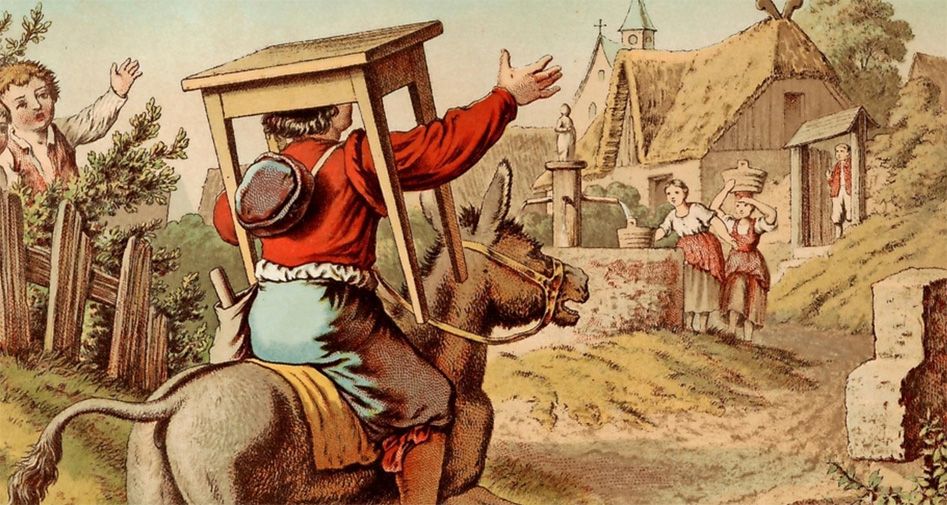
 Facebook
Facebook  Whatsapp
Whatsapp  Messenger
Messenger  Telegram
Telegram Reddit
Reddit

